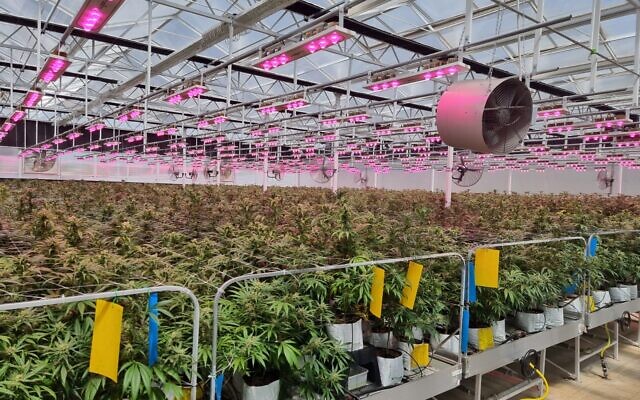In the confusing world of medical cannabis in Israel, patients often grope in the dark trying to figure out how and where to get the products they need, says Elad Gazit, a medical cannabis patient himself and founder of a startup that aims to address the problem.
Gazit’s company, Cannbis, seeks to become a go-to resource and online marketplace specifically for patients like him.
Patients have “no access to data or information about what they need to do, what products they need, where they can buy them, what the prices are — there’s zero information flow,” Gazit said. It’s
Medical cannabis use is legal in Israel, but patients often complain that navigating the industry is confusing and frustrating and the path to obtaining a medical cannabis license from the Health Ministry is about as direct as a rollercoaster ride.
In an interview with The Times of Israel, Gazit said that the industry was a “Wild West,” being “immature” data-wise, with patients being forced to seek advice regarding chemovars (strains), doses, and delivery methods — such as smoking, vaping, or ingesting — on WhatsApp and Telegram groups because doctors and pharmacists lack comprehensive knowledge.
Consumption of medical cannabis has been legal in Israel for about 20 years, but the sector has yet to be fully integrated into the public health system and operates on the sidelines. The Health Ministry does not consider medical-grade cannabis medicine. It is approved for its therapeutic effects for a short list of specific conditions including PTSD, cancer, gastrointestinal conditions like Crohn’s and colitis, chronic pain, neurological disorders such as epilepsy and Parkinson’s, and palliative end-of-life care. There is room for exceptional cases but one of the criteria to move forward with a license application is to first exhaust all conventional medications, or pharmaceutical drugs.
But, even with a license in hand, new patients are often at a loss for what to do next. When they settle on a strain after some research and crowdsourcing, they may face a lack of consistency in the product. Since cannabis is a plant that is subject to its environmental conditions, the sustained quality of a given strain can differ depending on supplier and there is no standardized dosing. Patients very often embark on a trial-and-error period to determine what works for them.
As an entrepreneur and former venture capitalist, Gazit saw an opportunity. He linked up with fellow entrepreneur Oded Ben Dov to establish Cannbis, which the pair run in Ra’anana.

Medical-grade cannabis growing on tables in Israel. (Courtesy Israeli Medical Cannabis Agency)
Cannbis, similar to sites like Weedmaps in the US, offers detailed information on available cannabis flower strains such as their genetics, the levels of THC (the main psychoactive compound in cannabis), the terpenes (the aromatic compounds), the expected results — calm, creative, alert, focused, upbeat, sleepy — based on other patients’ input, and the suppliers and their reputations. Israel is home to about 10 licensed growing companies.
Cannbis also points patients to pharmacies near them that stock the products in real time, and they can order them for pickup or delivery.
Over a year into its operations, Gazit said, about 80,000 Israeli medical cannabis patients use Cannbis to read up on products and suppliers, check reviews, and place orders. Israel has nearly 110,000 medical cannabis license holders as of November 2021, according to the Israeli Medical Cannabis Agency (IMCA), operating under the auspices of the Health Ministry.
“I came to this industry as a patient, and we built Cannbis from the bottom up,” said Gazit, emphasizing that he and Ben Dov approached the business from a patient perspective to help users make more informed decisions.
Cannbis also engages directly with the medical and pharmaceutical communities to provide informal training on how to help patients choose products, hosting monthly webinars for doctors and pharmacists. The company hopes to soon offer online one-on-one consultations between patients and medical professionals.
“We’re responsible for connecting [between] the commercial medical side [of the industry] and the users and bring everyone to the table,” Ben Dov said in the interview. Ben Dov is also the founder of Sesame Enable, the developer of a touch-free smartphone for people with disabilities (no longer commercially available).

Marijuana bags ready for use are seen at the BOL (Breath Of Life) Pharma laboratories in Israel’s second-largest medical cannabis plantation, near Kfar Pines in northern Israel, on March 9, 2016. (Jack Guez/AFP)
Cannbis takes a fee from the cannabis orders pharmacies receive through the site. Gazit said the company currently works with over 50 pharmacies, both chains and private shops. “We’re bootstrapped because we fill a need.”
The startup hopes to develop its educational model to “offer real solutions to pharmacies,” said Ben Dov.
“In dispensaries in the US and Canada, you have real expertise, people who really know the information. Here, the pharmacists have maybe 6-8 hours of training. The doctors don’t do much beyond giving the license. Medical cannabis is not like an Acamol [a popular Israeli painkiller and fever-reducer]. You need quite a bit of knowledge,” Gazit explained.
Cannbis also hopes to add additional data sources to the site. “Our vision is to gather more data, eventually cross-referencing [strains with data] from clinical trials, and using tech [like AI] to study the data,” he added.
The medical cannabis community “is a very invested community where people really want to help each other.”
A growing community
A recent survey Cannbis said it conducted with patients found that 60% of respondents use medical cannabis for chronic pain, 20% for PTSD, and about 5% for cancer-related symptoms. Nearly 90% of its responding patients said medical cannabis greatly improves their quality of life and around 80% claimed a vast reduction in pain and improvements in appetite and sleep.
The number of Israeli medical cannabis license-holding patients has grown quickly over the past three years, from some 32,000 in January 2019 to 108,013 two months ago.
Recreational use of cannabis is currently illegal in Israel, though the Public Security Ministry partially decriminalized it in 2017, setting fines and treatment for initial offenders instead of criminal procedures.
In June, a bill to decriminalize recreational cannabis use failed to clear a vote in the Knesset plenum, due to opposition from lawmakers in the coalition’s Islamist Ra’am party.
A new version of the bill that expands the ease of access to medical cannabis patients, while not decriminalizing recreational use, passed a preliminary reading in the Knesset in October. Under the terms of the bill, those granted a license from the Health Ministry will be legally allowed to grow, distribute, and possess a certain amount of cannabis for medical purposes.
Strict regulations over local producers in recent years have led to a chronic shortage in medical cannabis available to those with a prescription. Israel also imports a significant amount of medical cannabis and was crowned the top global importer of medical cannabis flowers in 2020, according to data compiled by the Tel Aviv-based Israeli Cannabis Magazine and Marijuana Business Daily.
Credit: Source link





















